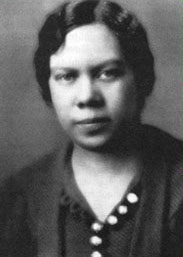

Ruth Howard, PhD, was born on March 4, 1900, in Washington, D.C. Unknown to Reverend and Mrs. William James Howard, their eighth and youngest child Ruth would leave a lasting imprint in history. Dr. Howard became the first African American woman to earn a PhD in psychology, marking a significant milestone in American history. Prior to her completing her doctorate, Howard earned a degree in social work from Simmons College in Boston. Her dedication to helping families and children within her community was evident early on in her career. She started work as a social worker through the Cleveland Urban league and then worked with the Cleveland Child Welfare Agency.
Her work involved meeting representatives from schools and medical and child clinics, many of whom “didn’t understand or sympathized with cultural groups other than their own. This was markedly true about Negroes for whom they had firmly fixed preconceived ideas…” (Howard, 1983, p.58). Only the chief psychologist of the Cleveland Board of Education seemed to have some understanding of the needs of the black community. This unnamed woman spurred Howard to pursue a career in psychology.
In 1934, she received her PhD in psychology and child development from the University of Minnesota. Her dissertation was the first of its kind, which studied the developmental history of 229 sets of triplets.
She received an internship at the Illinois Institute for Juvenile Research after receiving her doctorate and eventually began her own clinical psychology based private practice. From 1940-1964, Beckham co-directed the Center for Psychological Services along with her husband, Albert Sidney Beckham.
As Howard’s clinical practice grew, she also pursued postdoctoral studies at the University of Chicago where she studied projective techniques with Dr. Robert Havinghurst; client-centered therapy with Dr. Carl Rogers; reading therapy with Dr. Helen Robinson; and play therapy with Virginia Axline, who was just beginning to write about this new developing sub-field.
In 1944, Howard published her own study of play interviews with kindergartners and fourth-graders, focusing on how these play interviews could be used to detect war attitudes.
From 1964-1966, she worked at the McKinley Center for Retarded Children as a psychologist. Afterwards, she worked at Worthington and Hurst Psychological Consultants as a staff psychologist until 1968. After that, she held became a psychologist for the Chicago Board of Health until 1972.
Although Howard had her plate full at times, her commitment did not waiver as she served in numerous community and professional organizations. She was a volunteer for the Young Women’s Christian Association and helped organize the National Association of College Women. Some of Ruth Howard’s professional memberships included the American Psychological Association, the International Psychological Association, and the International Council of Women Psychologist.
